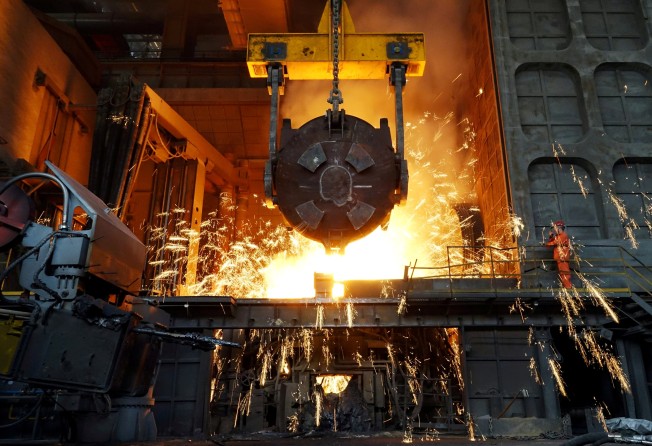China says state-owned enterprises are ‘independent market players’
- State assets oversight agency denies any ‘systematic arrangement for extra subsidies’ for firms controlled by central government
- Sasac chief Xiao Yaqing also calls for more cooperation with foreign firms

China’s state assets oversight agency denied there is a “systematic arrangement for extra subsidies” for central government-owned firms and called for more cooperation with foreign companies, amid growing criticism from the US and Europe over unfair competition.
“State-owned enterprises are independent market players. They are self-operated, self-financed, self-sustained, self-disciplined and self-developed,” Xiao Yaqing, chairman of the State-owned Assets Supervision and Administration Commission (Sasac) under the State Council, said on Saturday.
“This is the direction of the Sasac. Therefore, state-owned enterprises and enterprises with other ownership structures are equally involved in market competition and are equally protected by the law,” said Xiao, who was speaking at the National People’s Congress in Beijing.
“Chinese law does not stipulate that subsidies must be offered to state-owned enterprises.”
He added that the government and various departments were “consolidating and regulating various subsidies” to boost the efficiency of state companies.
The United States and the European Union – China’s largest trading partners – have long complained that state-owned Chinese firms enjoy benefits such as monopolies in certain sectors and lower-cost financing than is available to private firms, which they say distort the market and disadvantage all private companies. It is also one of the issues Washington has been pressing Beijing to address in the protracted trade war.
“We hope that the [trade talks between] China and the US will produce a good outcome,” Xiao said. “Cooperation, we believe, is an important foundation for competition. We have had good cooperation with overseas companies. And because of that cooperation, Chinese companies, especially state-owned firms, can further deepen reforms, boost the quality of development and strengthen management. This is a win-win that we hope to see in the future.”
Xiao also dismissed reports that state-owned firms were now taking over private companies through a mixed-ownership structure. “Logically [the idea that state-owned firms are taking over private firms] is not correct. At any given time, certain companies will do better [than others].”
Analysts said state-owned enterprises were more likely to receive financing from banks than private companies, but historically they did not invest as much as those from the private sector in fixed assets, which accounted for economic growth.
Chen Yuyu, an economics professor at Peking University’s Guanghua School of Management, said while financial institutions tended to provide funds to state-owned enterprises, “not all state-owned enterprises have high returns and good investment opportunities”.
“Some state-owned enterprises rely on expanding their scale, and they are adding new debts rolling over old debts. But are they able to repay those debts in 10 years? This is an urgent problem that needs to be addressed,” Chen said.
China started a new round of reforms in 2016 aimed at streamlining its sluggish state-owned enterprises by introducing private capital, reducing overcapacity, closing down “zombie” subsidiaries and restructuring assets.
While Beijing has cut the total number of companies under central government control, the assets of state firms through consolidation are getting bigger, with profits hitting record highs, according to data released by the Sasac on Saturday.
Assets held by China’s state-owned enterprises reach 58.2 trillion yuan last year, up from 54.5 trillion yuan in 2017. The net profits of those companies meanwhile jumped 15.7 per cent from 2017 to 1.2 trillion yuan last year.
The Sasac also said the “principal part of the task of dealing with zombie enterprises and enterprises operating with difficulties has basically been completed”.
But Ge Honglin, chairman of the state-owned Aluminium Corporation of China, said tackling the zombie company issue was difficult.
“The party and the government have issued clear orders to move faster on the clean-up of zombie companies since 2014, but the result is not ideal so far,” he told more than 2,000 political advisers in Beijing.
Zombie enterprises are consistently unprofitable firms that remain in operation only because of government subsidies or regular loans from state-owned banks.
Ge urged China’s cabinet to set up a task force and coordinate with other authorities to help with the clean-up task by providing financial support via bond issues and favourable pension fund policies.
Additional reporting by Xie Yu